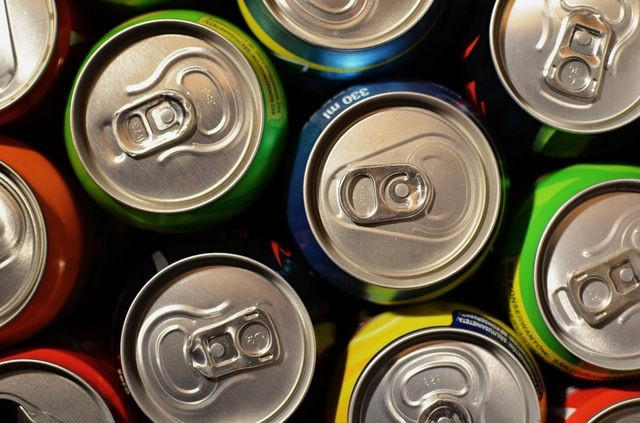Energy Drink Side Effects: Man Diagnosed With Severe Hepatitis After 3 Weeks Of Overdosing

Many of us have chugged down an energy drink or two to meet a deadline or during a night out with friends. These beverages deliver a boost of energy with stimulant drugs, mainly caffeine, to help us stay physically and mentally alert. However, a cautionary tale published in BMJ Case Reports found drinking up to five energy drinks a day can wreak havoc on our health, possibly leading to liver damage, and even hepatitis.
Energy Drink Side Effects
A construction worker in Florida sought help after developing vomiting, jaundice, and abdominal pain. The 50-year-old man told doctors in the emergency room he was feeling ill for two weeks, with symptoms including abdominal pain, a lack of appetite, nausea, and the vomiting. Originally he thought he developed the flu, but soon "became alarmed when he developed dark urine and generalized jaundice," wrote the doctors in the report.
The doctors asked the patient about any smoking, alcohol, and illegal drug use and diet. The man received a tattoo in his 20s, but he never had a blood transfusion, nor did he engage in high-risk sexual behavior (common ways of contracting hepatitis). He also did not have any family history of liver disease. Despite his assumingly clean health record, one behavior stood out: the consumption of four to five energy drinks a day over the last three weeks.
During a physical exam, doctors found the man's abdominal pain was located near his liver; his jaundice was a sign of liver problems. This occurs when the liver has trouble breaking down worn-out red blood cells, according to Johns Hopkins Medicine.
After additional tests, it was determined the man had acute hepatitis, which is liver inflammation often triggered by infection with one of the five hepatitis viruses. The patient was also found to have chronic hepatitis C, a different type of liver infection, which remains in a person's body. The doctors do not think the man's chronic hepatitis infection was related to the acute condition that landed him in the hospital. They believe the energy drinks were to blame, specifically niacin, or vitamin B3.
Vitamin Overdose
Caffeine is often seen as the "bad seed" of energy drinks, but large quantities of "natural ingredients" like B vitamins often go overlooked. The man’s energy drink contained 40 milligrams (mg) of vitamin B3, also known as niacin, which is double the 20 mg recommended daily value, wrote the doctors. Since he was drinking four to five drinks a day, his vitamin B3 daily intake value ranged from 160 mg to 200 mg.
High levels of niacin, like 500 mg in a single day, can lead to liver toxicity, according to the report. Niacin is linked to increased blood liver enzymes, jaundice or skin yellowing, and higher levels of abdominal fluid. Unsurprisingly, niacin overdoses can result in severe liver damage or liver failure. Although the man drank less than this amount, doctors suspect an “accumulative effect” of the vitamin could have led to his liver damage.
It was revealed he did have an increase in the number of enzymes called transaminases, which suggest liver damage. The liver biopsy revealed he had acute hepatitis, and doctors also found evidence of the chronic hepatitis C infection.
"Though the patient was found to have HCV [hepatitis C virus] infection, we did not think HCV was responsible for his acute hepatitis," wrote the doctors.
A Similar Case
This case is rare, but it’s not the first to be reported. In a 2011 case published in the Journal of Medical Case Reports, a 22-year-old healthy woman developed acute hepatitis after drinking about 300 mg of vitamin B3 from energy drinks each day for two weeks. Her physical examination revealed mild epigastric tenderness, while her initial blood tests revealed elevated alanine aminotransferase, aspartate aminotransferase, and total bilirubin. The woman was discharged four days later after her symptoms had resolved.
In the new case, the patient’s symptoms were cleared by the third day of hospitalization. He stopped drinking energy drinks, and was told by doctors to avoid any similar products that could contain vitamin B3.
Energy Drink Safety
The relationship between acute hepatitis and energy drink consumption is still being explored, but researchers warn patients to be educated about the risks of liver toxicity involved in downing too many. Plenty of people assume that energy drinks with the label “natural ingredients” means they must be healthy for the body.
Although vitamins and dietary supplements have been recognized as hepatotoxins, they continue to be ignored by patients and doctors alike, the authors warn. This is due to the common misconception that because they have "natural ingredients" they must be harmless. However, about 23,000 emergency department visits each year are related to dietary supplements.
Next time, think about reaching for a cup of coffee instead of an energy drink for a boost.
Source: Harb JN, Taylor AZ, Khullar V et al. Rare cause of acute hepatitis: a common energy drink. BMJ Case Reports. 2016.



























